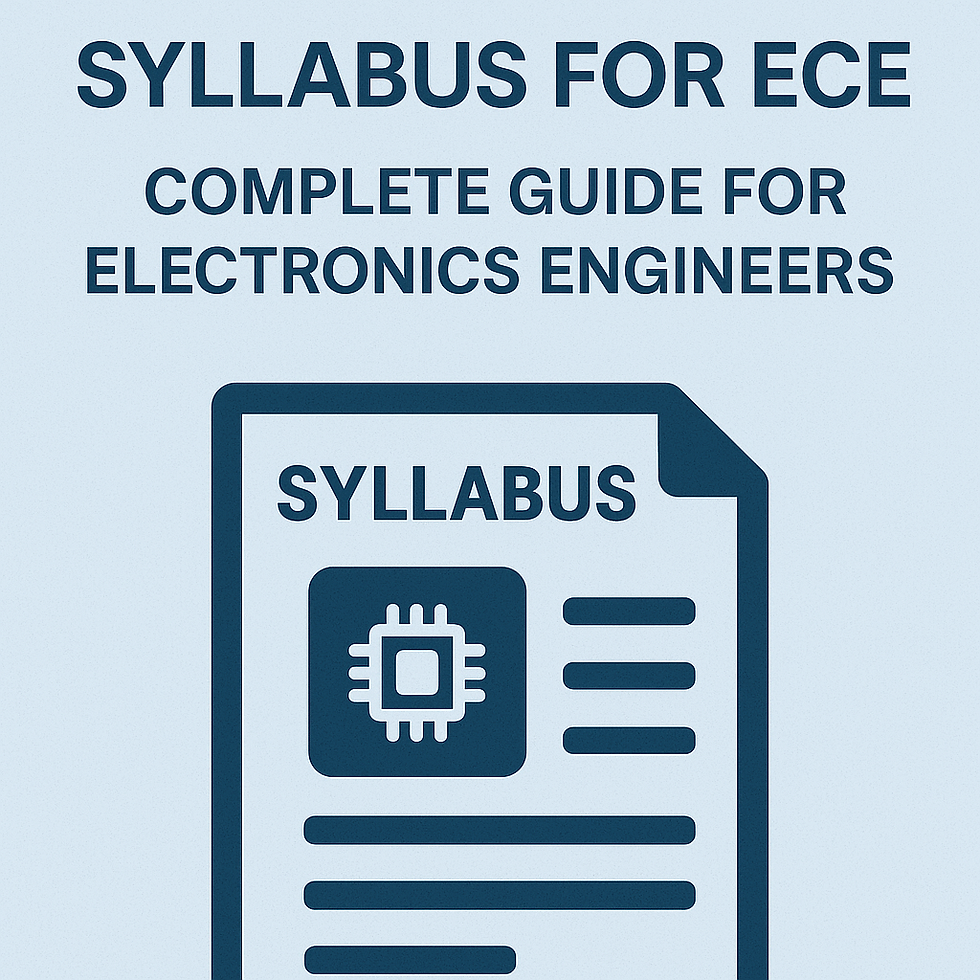GATE 2026 Syllabus for ECE: Complete Guide for Electronics Engineers
- Anurag Kumar
- Jun 9, 2025
- 3 min read
Updated: Jul 1, 2025
If you're an electronics engineer preparing for the GATE exam 2026, understanding the GATE syllabus for ECE is your first step toward success. This article provides a complete guide to the GATE 2026 syllabus for Electronics and Communication Engineering (ECE), along with tips for GATE preparation, the importance of GATE previous year papers, and key subjects to focus on.

Introduction to GATE for Electronics Engineers-
The Graduate Aptitude Test in Engineering (GATE) is a national-level entrance examination that tests the understanding of various undergraduate subjects in engineering and science. For ECE students, the GATE examination opens doors to M.Tech admissions in top institutes like IITs and NITs, public sector jobs (PSUs), and research opportunities.
The GATE exam for ECE is one of the most competitive streams, and knowing the latest GATE 2026 syllabus for electronics engineering is crucial for effective planning.
GATE 2026 Syllabus for ECE-
Here is the official breakdown of the GATE exam syllabus for ECE:
Engineering Mathematics
A common subject across all GATE papers, it covers:
Linear Algebra
Calculus
Differential Equations
Complex Variables
Probability and Statistics
Numerical Methods
Vector Calculus
Transform Theory
2. Networks, Signals, and Systems
Network Solution Methods
Theorems (Thevenin, Norton, etc.)
Transient and Steady-State Analysis
Fourier Series and Transforms
Laplace Transforms
Z-Transform
Discrete-Time Signal Processing
Sampling Theorem
3. Electronic Devices
Semiconductor Physics
PN Junction
Zener Diodes
BJT, MOSFET, LED, Photodiodes
Operational Principles and Characteristics
4. Analog Circuits
Op-Amps and Applications
Amplifiers
Oscillators
Filters
Feedback and Stability
5. Digital Circuits
Number Systems and Codes
Combinational Circuits
Sequential Circuits
Logic Gates
Flip-Flops, Counters, Multiplexers
6. Control Systems
Feedback Principle
Transfer Functions
Bode Plots
Stability Analysis
PID Controllers
7. Communications
Analog and Digital Communication
AM, FM, PM
PCM, DPCM, Delta Modulation
Information Theory
Error Correction Codes
8. Electromagnetics
Maxwell’s Equations
Waveguides
Transmission Lines
Antennas
EM Wave Propagation
GATE Subjects for ECE: Weightage and Focus Areas-
While the entire ECE GATE syllabus is important, certain subjects tend to have higher weightage based on GATE previous year question papers:
Subject | Approximate Weightage |
Networks & Signals | 15% |
Communications | 15% |
Control Systems | 10% |
Digital Circuits | 10% |
Electronic Devices | 10% |
Analog Circuits | |
Electromagnetics | 10% |
Engineering Mathematics | 13% |
General Aptitude | 15% |
Tip: Analyzing GATE previous year papers can help in understanding trends and prioritizing high-yield topics for the GATE exam 2026.
GATE Exam Pattern for ECE-
Understanding the exam pattern is just as important as knowing the GATE 2026 syllabus. Here's a quick look at the structure:
Total Marks: 100
Duration: 3 hours
Sections:
General Aptitude – 15 marks
Engineering Mathematics – 13 marks
Subject-specific topics (ECE) – 72 marks
Types of Questions:
Multiple Choice Questions (MCQs)
Multiple Select Questions (MSQs)
Numerical Answer Type (NAT)
How to Prepare for GATE 2026 ECE-
Here are some tips to boost your GATE preparation:
1. Understand the Syllabus Thoroughly
Start with the official GATE 2026 syllabus for ECE. Break it into manageable topics and create a study plan.
2. Practice GATE Previous Year Question Papers
Solving GATE previous papers is crucial. It helps you:
Understand the question pattern
Identify important topics
Improve speed and accuracy
3. Use Standard Books
Follow reputed authors and standard books.
4. Attempt Mock Tests and Revise Regularly
Mock tests simulate real GATE exam conditions and help in time management. Regular revision ensures you retain what you study.
Book Mock interview NOW!
Conclusion
The GATE 2026 syllabus for ECE is both comprehensive and challenging. Success in the GATE exam requires a deep understanding of core electronics concepts, consistent practice using GATE previous papers, and smart revision strategies.
Whether you're aiming for higher studies, PSU jobs, or research, mastering the ECE GATE syllabus is your gateway to a bright future.






Comments